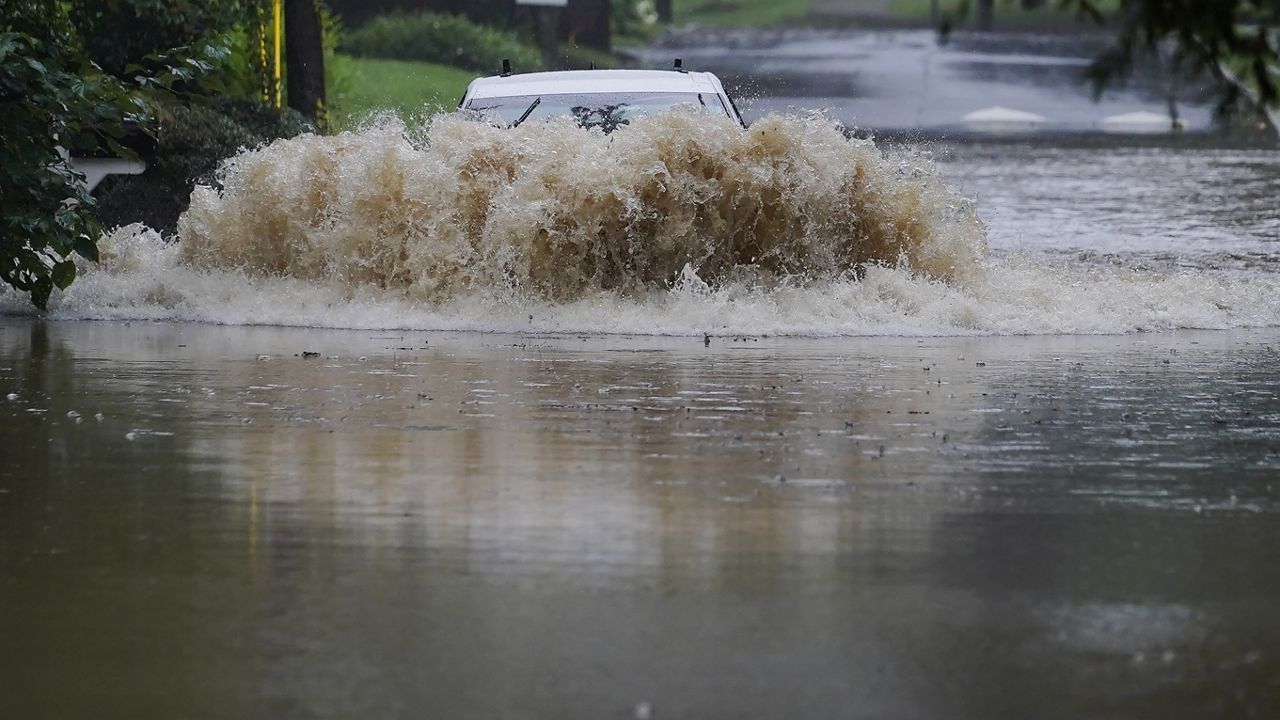Tropical Storm Fred weakened to a depression and spawned several apparent tornadoes in Georgia and North Carolina on Tuesday as it dumped heavy rains into the Appalachian mountains along a path that could cause flash floods as far north as upstate New York.
One death was reported — a Las Vegas man whose car hydroplaned near Panama City, Florida, Monday night and overturned into a water-filled ditch, the Florida Highway Patrol said.
Fewer than 30,000 customers were without power in Florida and Georgia after the storm crashed ashore late Monday afternoon near Cape San Blas in the Florida Panhandle. Emergency crews were repairing downed power lines and clearing toppled trees in Fred’s aftermath. Some schools and colleges in Florida, Alabama and Georgia canceled Tuesday’s in-person classes due to the storm.
The National Hurricane Center said Fred had top sustained winds of 35 mph as it crossed southeast Alabama into western and north Georgia. Senior hurricane specialist Stacy Stewart said Tuesday that it could dump 5 to 7 inches of rain into parts of Alabama, Georgia and the Carolinas — and possibly up to 10 inches of rain in isolated spots, causing flash flooding in mountainous areas.
Clay Chaney, a meteorologist with National Weather Service, said a local fire chief in North Carolina told the agency a tornado was on the ground in northern Iredell County early Tuesday afternoon. The weather service was also looking into reports of a tornado hitting Alexander County. As many as 14 possible tornadoes were reported across Georgia, South Carolina and North Carolina, according to the weather service.
Parts of western North Carolina, already soaked by rain not directly associated with Fred, braced for more rainfall through early Wednesday. Transylvania County, south of Asheville, declared a state of emergency after 10 inches fell Monday, causing landslides, flooding roads and destroying at least one home.
Transylvania County Chairman Jason Chappell, a lifelong resident, said it was the most intense flooding he’s seen in at least 20 years, and that he fears more damage to come. Floodwaters swamped a local factory Monday with several inches of water and damaged its parking lot.
“It really caught everyone off guard,” Chappell said. “No one was forecasting that amount of rain.”
With Fred blowing in Tuesday, National Weather Service meteorologist Ashley Pratt said Haywood, Transylvania and Jackson counties are likely to get the most rain, including another 6 to 8 inches in Transylvania.
One of the region’s major attractions, Grandfather Mountain State Park, closed on Monday. The North Carolina state park’s website said “trails are flooded and the water at stream crossings [is] dangerously high.”
At least six apparent tornadoes touched down in Georgia: One hit Americus, in the southwestern part of the state, damaging at least a dozen homes and an apartment complex. One hit Jeffersonville, near Macon, tearing metal siding off a sporting goods warehouse, knocking over a semitruck trailer and tossing around small boats, according to the National Weather Service. One destroyed a mobile home in Banks County, northeast of Atlanta, officials reported.
Heavy rains drenched parts of metro Atlanta just before dawn Tuesday, snarling commutes.
One weather station near Panama City, Florida, recorded almost 9 inches of rain in two days.
Meanwhile, reconnaissance aircraft found Grace regained tropical cyclone strength early Tuesday. Grace lashed earthquake-damaged Haiti as a tropical depression on Monday, dumping up to 10 inches of rain that pelted people huddling under improvised shelters in the aftermath of Saturday’s 7.2 magnitude earthquake, now blamed for more than 1,400 deaths.
Grace’s sustained winds grew to 65 mph early Wednesday as it made its way westward on a path between southeastern Cuba and Jamaica. Forecasters said it could be near hurricane strength as it approaches Mexico’s Yucatan peninsula late Wednesday or early Thursday. It was about 40 miles south south-east of Grand Cayman where a tropical storm warning was in effect, along with the Yucatan Peninsula of Mexico from north of Cancun to Campeche and from south of Punta Herrero to Puerto Costa Maya.
A hurricane warning is in effect for Yucatan Peninsula of Mexico from Cancun to Punta Herrero, including Cozumel.
Tropical Storm Henri, meanwhile, was about 160 miles south-southwest of Bermuda. The small tropical cyclone had 65 mph winds and was expected to circle widely around the island, the hurricane center said.
The Associated Press contributed to this report.



